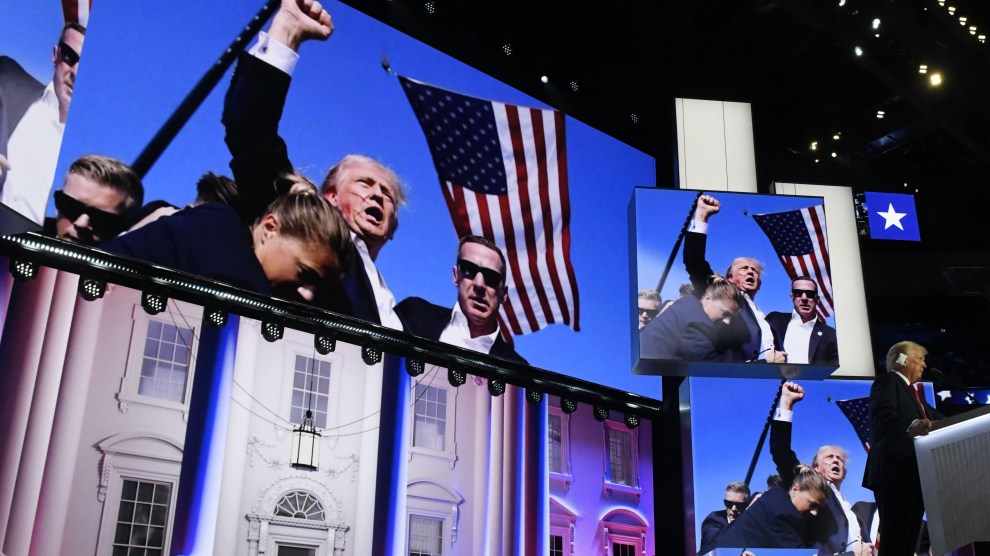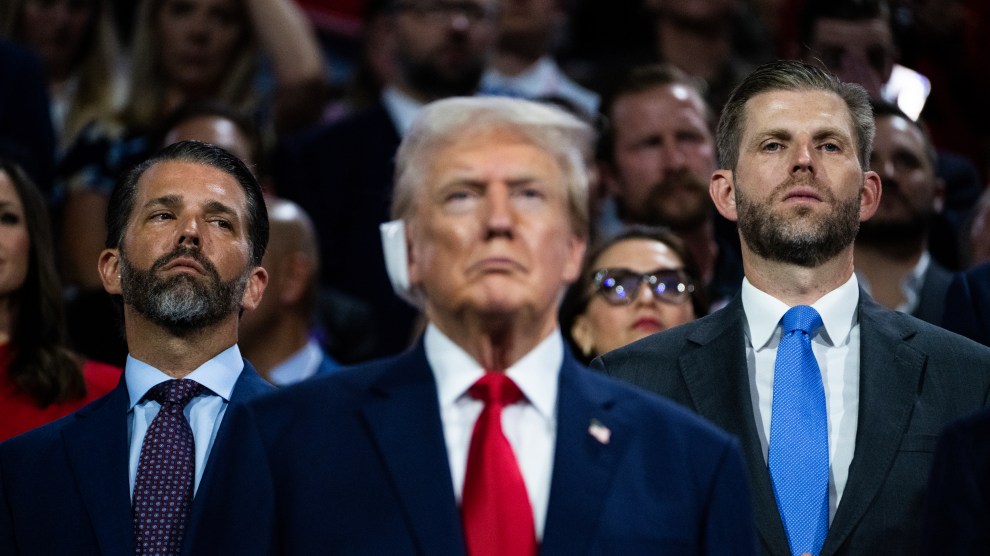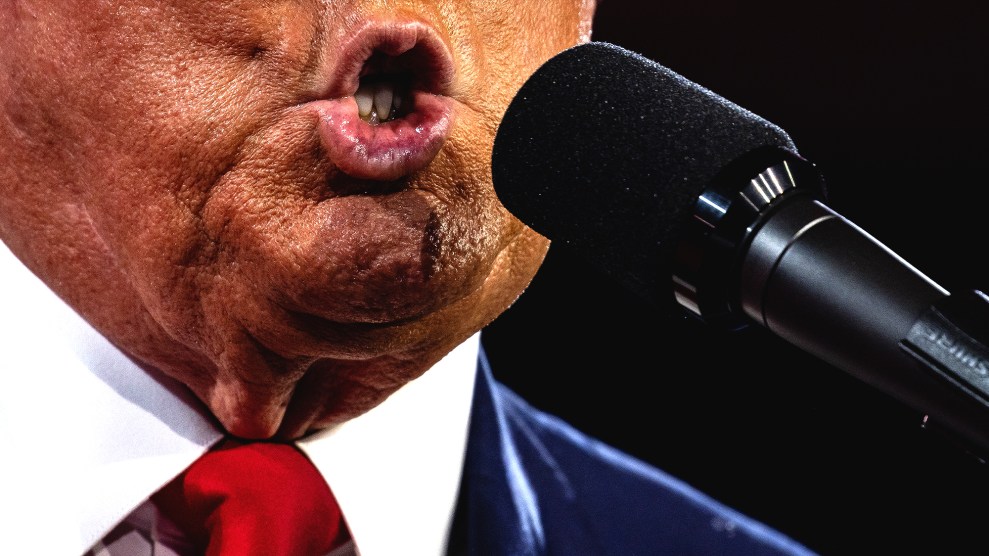
Trump speaks at the RNC in Milwaukee, July 18, 2024Mark Hertzberg/ZUMA
One certainty about the assassination attempt two weeks ago against former President Donald Trump is that rampant conspiracy theories about it will endure—probably forever. The fascination with spectacular, if highly improbable explanations long predates social media. Yet it resonates now with the Trump shooter’s documented search for information about the JFK assassination, which has sustained a cottage industry of books, movies, and other content for more than half a century.
Wild claims about everything from Trump staging the attack to the Biden White House orchestrating it began spreading online just hours after the fateful campaign rally on July 13 in Butler, Pennsylvania. Gunfire from a rooftop approximately 150 yards from the stage wounded Trump and three supporters in the crowd, one fatally. The tectonic event shook the 2024 presidential race and is the focus of sweeping investigations by the FBI, Homeland Security, and Congress, and has already prompted the resignation of the Secret Service director. But setting aside any outlandish assertions from both the political right and left about what happened, some key questions continue to loom since the horrific attack.
Was Trump actually hit by a bullet?
Unclear, according to the FBI. The ex-president and his top allies maintain that he was, but when FBI Director Christopher Wray testified before Congress on Wednesday about the ongoing investigation, he responded to one inquiry saying, “With respect to former President Trump, there’s some question about whether or not it’s a bullet or shrapnel that hit his ear.” [Update, July 26, 6 p.m. PDT: The FBI said in a statement late Friday that it determined Trump was struck by “a bullet, whether whole or fragmented into smaller pieces.”]
The attack is no less consequential either way, but this is a signifcant detail and not just another baseless conspiracy theory, even if GOP House Speaker Mike Johnson insists otherwise. As national security expert Juliette Kayyem noted, “Wray, known for exact phrasing and being careful, didn’t say this on accident.” The specificity of how Trump was wounded is important for public transparency and a full forensic accounting of the attack, relevant to rigorous assessment of the security failures (more on that below), the protective response by Secret Service agents, and the nature of Trump’s injury and his recovery.
It also pertains to how the Trump campaign has used the assassination attempt politically. When Trump was nominated at the Republican National Convention in Milwaukee five days later, his brush with death was a major theme. Large images of the iconic news photo of him being pulled from the rally stage, his fist in the air and face streaked with blood, provided a backdrop on the main stage. Multiple speakers referred to his survival as the result of divine intervention. Sen. Tim Scott of South Carolina and others lionized Trump, literally, and declared his survival and candidacy nothing short of a holy miracle.
In his acceptance speech, Trump, his right ear still bandaged, gave a dramatic, graphic account. “I said to myself, ‘Wow, what was that? It can only be a bullet.’” He said he brought his hand down from his ear “covered with blood, just absolutely blood all over the place.” He then emphasized, “There was blood pouring everywhere, and yet in a certain way I felt very safe because I had God on my side.”
Trump has released no official medical records from after the shooting, nor has there been any public account from the doctors who first treated him at Butler Memorial Hospital. Rep. Ronny Jackson of Texas, a Trump ally who served as his White House physician, released a memo a week after the shooting describing a bullet wound, but Jackson’s strident partisan role and track record as a doctor raise questions about his credibility.
An analysis published Thursday by the New York Times suggests that Trump’s ear was indeed grazed by a bullet, the first of eight reportedly fired by the gunman. The Times also reported that FBI investigators are seeking to interview Trump directly. Given the swirl of confusion and speculation about his injury, it seems all the more curious that he and his campaign haven’t provided further information.
Is there any clearer picture yet of the shooter’s motive?
No. Wray this week again reiterated the lack of any clear motive, even after extensive FBI investigation. That could still change, but it would be extraordinary, to say the least, to go from no indication of a motive two weeks after an event of this magnitude to a clear one. As I reported last week, the deceased perpetrator, 20-year-old Thomas Matthew Crooks, appears to have left behind little indication of any political views or his mindset ahead of the attack, according to the FBI and a flurry of media reporting. He was a registered Republican voter, but also made a small donation to a liberal political group and came from a mixed political household.
This lack of a motive is particularly important in light of all the conspiracy theories and partisan exploitation that have filled the void. Indeed, there is a distinct possibility we may never have a clear picture of what drove Crooks, who also searched online, according to investigators, for information about President Biden’s appearances, the Democratic National Convention, and “major depression disorder.”
Ultimately, a thorough investigation of this case may show, as with many assassination attempts in modern history, that political ideology was not a driving factor. It is quite plausible that Crooks was suicidal and wanted to go out in a blaze of infamy, an act that has grown more common among disturbed and desperate young men, as I discussed with threat assessment experts last week. (For more on this: my book on preventing mass shootings, Trigger Points, examines the history and complexity of motives among many perpetrators, including those who target high-profile public figures.)
What explains the catastrophic failures with security?
The public has very little idea thus far. The shooting stands as a disaster of stunning proportions for the Secret Service, whose director, Kimberly Cheatle, resigned this week under intense bipartisan pressure.
The overarching question of the security failure already encompasses a long and troubling list of specific issues: How could the Secret Service not secure a rooftop that was within shooting range and had clear sight lines to Trump? How could the attacker have flown a drone over the rally location just two hours before Trump took the stage? Why was Trump allowed to keep speaking at the podium even after the Secret Service and its law enforcement partners were aware of Crooks’ suspicious behavior, and then even after counter-snipers had him in their sights?
Those are just scratching the surface.
“I’m not going to get into specifics of the day,” Cheatle said during a congressional hearing this week, citing an ongoing investigation. “There was a plan in place to provide overwatch, and we are still looking into responsibilities.”
Voluminous official tomes and many books are sure to be written in the months and years ahead on this epic fiasco.
Will Trump world continue to weaponize the shooting politically?
Almost as surely as the sun rises in the east. In the immediate aftermath, many Trump allies fired off partisan blame—without any evidence—and they haven’t stopped since. The rhetoric has come from Trump supporters in Congress including Rep. Mike Collins (“Joe Biden sent the orders”) and Rep. Marjorie Taylor Greene (“They tried to murder President Trump”), and from Trump’s sons Eric (“I said that the Democrats would stop at absolutely nothing”) and Don Jr. (“They’re now trying to kill him”). Not to mention from the man who would become Trump’s running mate two days later, Sen. J.D. Vance of Ohio, who said Biden’s campaign rhetoric “led directly” to the attack.
But they absolutely should stop. This stewing narrative is not only false but seriously dangerous: Threat assessment and law enforcement leaders told me it is fueling potential violence, already a heightened concern heading into the November election. As one source told me, “They’re piling on the idea that the opposition is so out to get Trump that they even tried to kill him, and therefore retaliation is justified. Only a small number of people might take violent action on this, but you don’t need much for things to get worse.” As another put it: “Extremist groups will take advantage of anything that fits into their narrative and this is a really big plot point for them.”
It is an accelerant on Trump’s continuing campaign of political incitement, aimed at migrants, the FBI and DOJ, judges, prosecutors, Democratic officials, journalists, and the many others he has long targeted. The fundamental premise of it all is that he is the alleged victim of a grand political conspiracy to take him down and steal the presidency from him, which is framed as a supposed Democratic or “deep state” plot. It is now being weaponized to whip up outrage by the same folks who are behind Project 2025. And in Trump’s telling, the ultimate target is not him but rather the Americans who support him: “They’re coming after you,” as he ominously puts it.
Meanwhile, Trump has kept up the steady incitement in recent weeks, including in his long, demagogic RNC speech—although this grim dimension of his campaign has gotten far less media attention than it deserves. As I wrote just a couple of weeks before the assassination attempt: “The question now isn’t about whether Trump will continue to stoke political violence in this way through the election. It’s about when and to what extremes he might do so, and how much more that will boost the odds of further violence to come.”

















